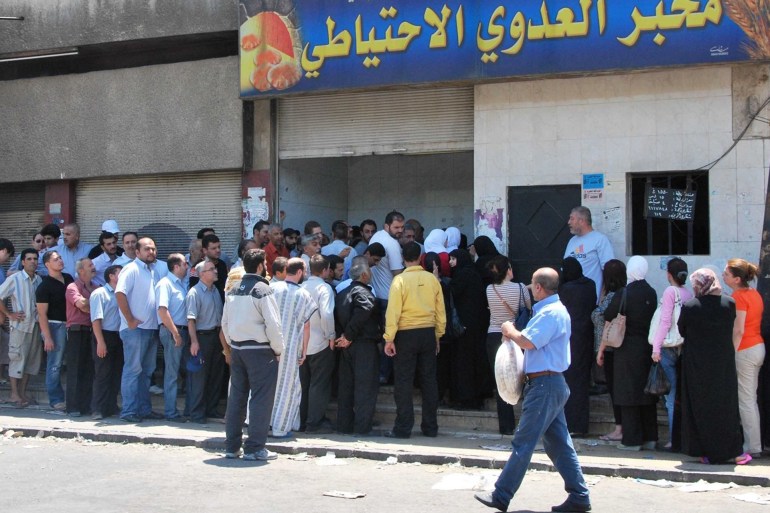In light of the rapid collapse of the Syrian pound, the government of the Syrian regime approved a 50% increase in the salaries of state workers, preceded by raising the prices of fuels and basic foodstuffs such as bread, rice and sugar, in a move that some described as increasing the suffering of low-income people and workers in the private sector.
This is the second increase in salaries in two years, and the increase in salaries and wages for state employees and workers is always associated with raising the prices of diesel (diesel fuel), bread and food supplies by more than double, which is worrying Syrian employees and deepening their crises in a country that has been witnessing a bloody war for a decade. .
In monitoring the new prices of fuel and food supplies, the regime government raised the price of diesel by 172%, the price of bread by 100%, and the price of sugar and rice by almost 100%.
Thus, the price of a liter of diesel became 500 Syrian pounds for all public and private sectors, including the Syrian Corporation for Bakeries and private sector bakeries, while the price of a bundle of bread became 200 Syrian pounds packed with a nylon bag.
laugh on chins
Talking about an increase in wages and hinting at it by the regime’s government has become a subject for jokes and ridicule among Syrians, instead of being a glimmer of hope for solving their economic problems that they face in securing daily food, heating materials and cooking gas.
An employee in the government of the Syrian regime, Youssef Al-Youssef (a pseudonym) described the increase as laughing at the beards and scattering ash in the eyes, especially since the increase was preceded by raising the prices of the two most important items in the lives of citizens: diesel and bread, which are related to transportation and daily food for every Syrian family.
Al-Youssef said - in an interview with Al Jazeera Net - that prices will rise to double, and this increase that was adopted will not work in solving the problem of the gap between wages and the price of food supplies, noting that this increase will result in more queues in front of ovens and gas stations.
He wondered about the benefit of increasing the salaries of Syrian employees at a time when the salary is not commensurate with the market price, and hardly secures the expenses of a week to 10 days at best for a family of 4 members.
The increase that was adopted will not help in solving the problem of the gap between wages and the price of food supplies (Al-Jazeera)
Queues and digital increase
During the past two days, the manifestations of the transportation crisis in the Syrian capital, Damascus, returned as a reflection of the increase in the price of diesel, as private bus stops appeared crowded with civilians waiting to arrive, while transportation was overwhelmed with rushing passengers.
With the increase in the price of diesel, the Ministry of Internal Trade and Consumer Protection in the regime's government raised public transport fares by approximately 30% from the old price, amid the return of queues in front of gas stations.
The increase in the salaries of employees approved by the Syrian regime will not change the equation of the decrease in the purchasing power of the Syrian citizen, since the increase in the level of commodity prices in the market is much higher than the value of the salary increase, which does not exceed 10 US dollars for the first category, according to researcher and economic analyst Younes.
Yunus said - in an interview with Al-Jazeera Net - that the fluctuation of the exchange rate absorbs the purchasing power of the Syrians, especially after the state lifted its hand from subsidizing basic commodities, describing this increase in the wages of employees in the state as a digital increase that disappeared before it was raised.
Younis pointed out that the Syrian government does not have the national currency to pay this increase, which the Minister of Finance, Kenan Yaghi, estimated at about 82 billion pounds per month, wondering where it will be financed and printed, especially that the cost of printing is greater than its financial value.
The economic analyst suggested that the Syrian regime will try to push the increase by accelerating the circulation of the Syrian pound, and "this is very dangerous, which will cause prices to rise and the trend towards privatizing the rest of the Syrian economy, and legitimizing the money of warlords through this."

